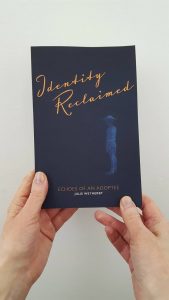Writing an Adoption Memoir
“It is my sincere desire that my own personal story will help those who have not been adopted to understand those of us who are a little better. And it is my sincere desire that adoptees can, perhaps, understand themselves a little better too.”
Julie Wetherby ‘Identity Reclaimed: Echoes of an Adoptee’

How it all began
Since publishing my memoir at the end of September 2017 a number of adoptees I’ve befriended on social media have told me how much they want to write their own story. I cannot overstate just how immensely powerful it is to do so, although getting started on such a project can seem overwhelming. To tell any story at all requires patience, determination and perseverance, but when it’s your own one, as an adoptee, it’s immense.
As soon as I embarked on the search into my past at sixty years of age I knew I’d tell mine. At first I thought I’d make it into a novel and set out to do so by studying story structure and the creation of character arcs. I was seventy five per cent through when the whole thing ground to a halt. The realisation dawned that I hadn’t found my own voice and wasn’t really telling my story at all but a vague, fictionalised version. So I stopped dead and moved onto a different writing project.
Around that time I read a particularly moving book entitled ‘A Street Cat Named Bob’ by James Bowen. It’s the personal account of a guy sleeping rough on the streets of London, adopted by a ginger cat who saved him. I knew then that the only way to tell my own story was to write a memoir. And so I sat down at my laptop and began to type, chapter after chapter, unable to believe how readily the words flowed from my fingers onto the screen. In a matter of days I’d written twenty chapters, then took a rest and returned to the other writing project. Later I met up with a friend who said she couldn’t wait to read my story and told me to hurry up and finish it.
Returning to it, I reread what I’d written, still unable to believe how I managed what I’d produced so far. Had my study of story structure and novel writing really helped? I wondered. Could I identify specific turning points? As I read through yet again I found that so far I’d managed two out of three major plot points and other strategic places that create a story’s forward momentum. And I’d achieved it without deliberate planning. At some deep down subliminal level I’d somehow absorbed these things, and with this discovery I was able to calculate the percentage point I’d reached and how many chapters were left to write. The amazing thing was the rest of it just slotted into place. Attempting a novel had clearly helped, but I’d learned the hard way.
I believe a knowledge of story structure and other strategies is extremely helpful when writing a memoir and I’m pleased to be able to share what I’ve learned here. Most important of all, I’ve discovered, is to find one’s own individual writing voice. How otherwise can a personal story be told truthfully and effectively?
With these thoughts in mind, I warmly encourage others to have a go. Adoptees need to tell their own stories, each one is unique and important, and a contribution to the world. We are greatly misunderstood, and the time has come to get more of these out there for our own self-healing, as well as to gain greater understanding from others.
” It feels to me in writing such a piece that it is more than even sharing a story, it is like extending a hand to others in an offer of friendship. Even if those people never meet you in person, there is shared experience and a sense of “It’s a journey to go through, but you are not alone. Look at me, I made it. You can too.”
There is huge comfort in that what is going on inside your innermost thoughts is understood in similar ways to others. Like a big sister telling you, “I’ve been there. I know. You’ve got this.”
Anja: Toronto